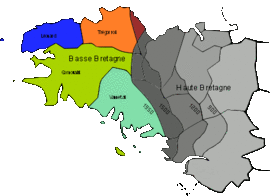Gallo language

| Gallo | ||
|---|---|---|
| Galo | ||
| Spoken in | ||
| Total speakers | 28,000[1] | |
| Language family | Indo-European | |
| Official status | ||
| Official language in | none | |
| Regulated by | ||
| Language codes | ||
| ISO 639-1 | None | |
| ISO 639-2 | ||
| ISO 639-3 | – | |
| Linguasphere | ||
| Note: This page may contain IPA phonetic symbols in Unicode. | ||
Gallo is a regional language of France. Gallo is a Romance language, one of the Oïl languages. It is the historic language of the region of Upper Brittany and some neighboring portions of Normandy, but today is spoken by only a small minority of the population, having been largely superseded by French.
Gallo was originally spoken in the Marches of Neustria, which now corresponds to the border lands of Brittany and Normandy and its former heart in Le Mans, Maine. As an Oïl language, it forms part of a dialect continuum which includes Norman, Picard and Poitevin, among others. One of the features that distinguishes it from Norman is the absence of Norse influence. There is some limited intercomprehension with adjacent varieties of the Norman language along the linguistic frontier and with Dgèrnésiais and Jèrriais. However, as the dialect continuum shades towards Mayennais, there is a less clear isogloss. The clearest isogloss is that distinguishing Gallo from Breton, a Celtic language traditionally spoken in the western territory of Brittany.
In the west, the vocabulary of Gallo has been influenced by contact with Breton, but remains overwhelmingly Latinate. The influence of Breton decreases eastwards across Gallo-speaking territory.
As of 1980[update], Gallo's western extent stretches from Plouha (Plóha), in Côtes-d'Armor, south of Paimpol (Paimpol), passing through Châtelaudren (Châtié), Corlay (Corlaè), Loudéac (Loudia), Pontivy (Pontivy), Locminé (Lominoec), Vannes (Vannes) and ending in the south on the Rhuys peninsula, in Morbihan.
Contents |
Status

One of the metro stations of the Breton capital, Rennes, has bilingual signage in French and Gallo, but generally the Gallo language is not as visibly high-profile as the Breton language, even in its traditional heartland of the Pays Gallo, which includes the two historical capitals of Rennes (Gallo Resnn, Breton Roazhon) and Nantes (Gallo Nauntt, Breton Naoned).
Different dialects of Gallo are distinguished, although there is a movement for standardisation on the model of the dialect of Upper Brittany.
Although a written literary tradition exists, Gallo is more noted for extemporised story-telling and theatrical presentations. Given Brittany's rich musical heritage, contemporary performers produce a range of music sung in Gallo (See Music of Brittany).
Examples
| English | Gallo | French |
|---|---|---|
| afternoon | vêpré | après-midi |
| apple tree | pommieu | pommier |
| bee | avètt | abeille |
| cider | cit | cidre |
| chair | chaérr | chaise |
| cheese | fórmaij | fromage |
| exit | desort | sortie |
| to fall | cheir | tomber (archaic: choir) |
| goat | biq | chèvre (slang: bique) |
| him | li | lui |
| house | ostèu | maison (archaic: hostel) |
| kid | garsaille | gosse |
| lip | lip | lèvre |
| maybe | vantiet | peut-être |
| mouth | góll | bouche (gueule = jaw) |
| now | astour | maintenant |
| number | limerot | numéro |
| pear | peirr | poire |
| school | escoll | école |
| squirrel | chat-de-boéz (lit. "wooden cat") | écureuil |
| star | esteill | étoile |
| timetable | orier | horaire |
| to smoke | betunae | fumer (archaic: pétuner) |
| today | anoet | aujourd'hui (archaic: hui) |
| to whistle | sublae | siffler |
| with | ô or côteu | avec |
Films
- Of Pipers and Wrens (1997). Produced and directed by Gei Zantzinger, in collaboration with Dastum. Lois V. Kuter, ethnomusicological consultant. Devault, Pennsylvania: Constant Spring Productions.
External links
- http://bertaeyn-galeizz.com/
- http://www.a-demorr.ht.st/
- http://www.maezoe.com/
- http://www.celtia.info/culture/languages/gallo.html
References
|
||||||||||||||||||||||||||||||||||||||||||||||||||||||||||||||||||||||||||||||||||||||||||||||||||||||

